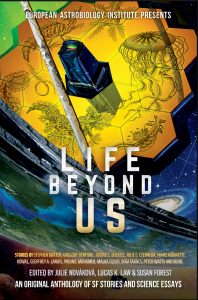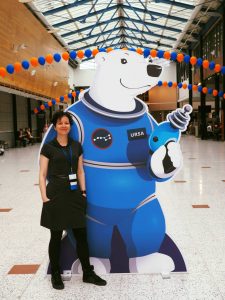My new story “Forever the Forest” is out in Life Beyond Us, an anthology edited by Julie Nováková, Lucas K. Law, and Susan Forest, published in cooperation with the European Astrobiology Institute. Every one of its 27 stories is paired with an essay diving deeper into the science behind the fiction.
I was immediately hooked by the idea! I grew up with Carl Sagan’s books, so being in this science outreach project means a lot to me. I also wanted to write my very own take on trees in space inspired by Silent Running (another thing I grew up with) and tap into my love for anything tree-ish, and here was my chance: I mixed up what I had read about NASA’s “Moon Trees” (1) and indigenous forest stewardship, namely “Helping forests walk” (2), and then I simply needed to tell it from the perspective of the trees.
Did I say “simply”? It was like wrestling with an Ent for every single word. Of course I’m not the first one to up take this challenge (I specifically like The Leaves of October by Don Sakers and the tree shapechanging sequence in The Riddle-Master of Hed by Patricia A. McKillip). It still felt like I needed to learn writing anew, because I wasn’t able to fall back on my senses of vision and hearing, my sense of time, and my perception of my body and its limits. But in the end, does it really matter if it’s another language or another mind I’m trying to relate to, with a whole different sensorium? Deep at my core, I’m a translator, and I try my best to translate different modes of inhabiting the world into a shared language, even if it feels like bouncing an image back and forth between funhouse mirrors. Sure, it’s bound to fail. But I aim to fail in a meaningful way.
So I kept asking: what is it like to be a forest? I used theories about mycorrhizal networks (3) to create a collective perception and wondered if the astronaut and the forest stood any chance of having some shared concepts to start a conversation. This is also where the wonderful companion piece “Astra Narrans” by Connor Martini begins its exploration and extrapolation of the core themes of the story in a way that transcends my humble attempts at establishing an understanding between the protagonists. If you want to learn how we can possibly communicate with any being that is not us, this essay is a splendid place to start.

This whole project has been a delight to be part of from beginning to publication and beyond. Big thanks to Julie Nováková for having me in the first place & her tireless work to make this anthology shine in any possible way, and to Susan Forest and Lucas K. Law at Laksa Media for working out the kinks of the story and making the whole book look incredibly good, and to Connor Martini for his thoughtful, knowledgeable and entertaining essay about semiotics! (Plus a big thank you to the beta readers who always have my back: Sonia Focke, Jennifer Hudak, Elena Kotsiliti, and Ella Voss.)
You’ll find materials and where to buy the book here, and it will not only enable you to roam through my alien woodlands, but also a wide selection of other adventures set in our solar system and far beyond. If you are intrigued by “Forever the Forest”, I bet you’d also enjoy “Defective” by Peter Watts, “Heavy Lies” by Rich Larson, and “Cyclic Amplification, Meaning Family” by Bogi Takács. I’d love for you to listen in on all those Conversations!
1 see: Moon Trees Stand as Living Testaments to First Voyages to Moon & Moon Tree
2 see: Assisted migration of forests in North America
3 read about the current state of this research here: Do Trees Really Support Each Other through a Network of Fungi?



